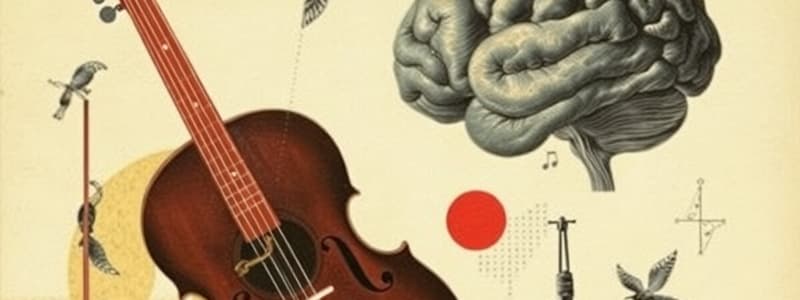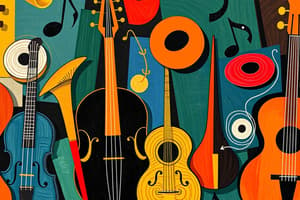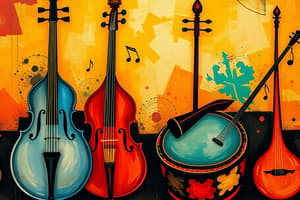Podcast
Questions and Answers
What is the main focus of the research conducted at Northwestern University?
What is the main focus of the research conducted at Northwestern University?
The main focus is to study how music affects the human brain.
Who is the head of the Auditory-Neuroscience Laboratory at Northwestern University?
Who is the head of the Auditory-Neuroscience Laboratory at Northwestern University?
Nina Kraus is the head of the Auditory-Neuroscience Laboratory.
What type of participants were involved in Nina Kraus's tests?
What type of participants were involved in Nina Kraus's tests?
Forty-five volunteers, some with music education and some without.
What method did Professor Kraus use to measure the brain's response to sound?
What method did Professor Kraus use to measure the brain's response to sound?
What simple sound was used in the experiments to test the brain's processing?
What simple sound was used in the experiments to test the brain's processing?
What is one example of music the volunteers listened to during the tests?
What is one example of music the volunteers listened to during the tests?
What lasting effects related to music training were the researchers interested in?
What lasting effects related to music training were the researchers interested in?
Why is capturing the electricity given off by nerves important in this research?
Why is capturing the electricity given off by nerves important in this research?
What visual difference did Ms. Kraus observe between musicians and non-musicians on the computer screen?
What visual difference did Ms. Kraus observe between musicians and non-musicians on the computer screen?
What is the significance of the 'fundamental frequency' in music?
What is the significance of the 'fundamental frequency' in music?
How does formal music instruction affect the brain's responses to sound?
How does formal music instruction affect the brain's responses to sound?
According to Professor Kraus, why is it important for musicians as they age?
According to Professor Kraus, why is it important for musicians as they age?
What role does the nervous system play in a musician's ability to understand speech in noisy settings?
What role does the nervous system play in a musician's ability to understand speech in noisy settings?
What potential impact does aging have on non-musicians' hearing abilities?
What potential impact does aging have on non-musicians' hearing abilities?
How does playing a musical instrument benefit the brain according to the research?
How does playing a musical instrument benefit the brain according to the research?
What does the research at Northwestern University suggest about the differences between musicians and non-musicians?
What does the research at Northwestern University suggest about the differences between musicians and non-musicians?
What benefit does playing a musical instrument have on memory?
What benefit does playing a musical instrument have on memory?
How do challenging musical tasks affect brain development according to Professor Kraus?
How do challenging musical tasks affect brain development according to Professor Kraus?
What is the 'Mozart Effect' as described in the text?
What is the 'Mozart Effect' as described in the text?
Why does Ms. Kraus argue against the idea that passive listening to music has the same benefits as actively playing an instrument?
Why does Ms. Kraus argue against the idea that passive listening to music has the same benefits as actively playing an instrument?
What does Ms. Kraus advocate for regarding music education in schools?
What does Ms. Kraus advocate for regarding music education in schools?
What comparison does Ms. Kraus make to illustrate her point about the necessity of active music participation?
What comparison does Ms. Kraus make to illustrate her point about the necessity of active music participation?
What type of music, according to some researchers, might produce similar effects to that of Mozart's music?
What type of music, according to some researchers, might produce similar effects to that of Mozart's music?
What did Professor Kraus say about the interplay between learning music and learning other subjects?
What did Professor Kraus say about the interplay between learning music and learning other subjects?
Flashcards are hidden until you start studying
Study Notes
Music and brain function
- Playing a musical instrument can change the brain’s anatomy, function, and how it works.
- Research shows that learning to play a musical instrument has a lasting effect on how the nervous system responds to sound.
- The study involved 45 volunteers: half had taken music classes and played an instrument, while the other half had not.
Sound and electrical activity
- Electrodes are placed on volunteers' heads to capture electrical activity in the brain in response to sound.
- This electrical activity is analyzed to determine how the nervous system responds to speech, music, and other sounds.
Musicians vs. Non-musicians
- The study found that musicians had larger neural responses to sound compared to non-musicians.
- The computer screen graph, or picture of the sound, was larger for the volunteers who played music.
- This suggests that musicians are better at processing sounds, particularly the fundamental frequency that carries pitch information.
Impact on hearing
- The study also found that musicians have better hearing, especially as they age.
- This is because the nervous system is better at responding to sounds that the brain has learned are important.
- Musicians are better at identifying and isolating the sounds they are interested in, such as their own instrument.
Music and memory
- Playing music forces the brain to remember the notes just played, strengthening memory pathways.
- This could also help with learning other languages or subjects.
The "Mozart Effect"
- The study emphasizes the importance of actively playing music rather than passively listening, disproving the idea that listening to music alone is enough.
Importance of music education
- The research suggests that music lessons should be included in education despite economic difficulties.
- This is because playing music provides a valuable benefit to brain development and hearing health.
Studying That Suits You
Use AI to generate personalized quizzes and flashcards to suit your learning preferences.




